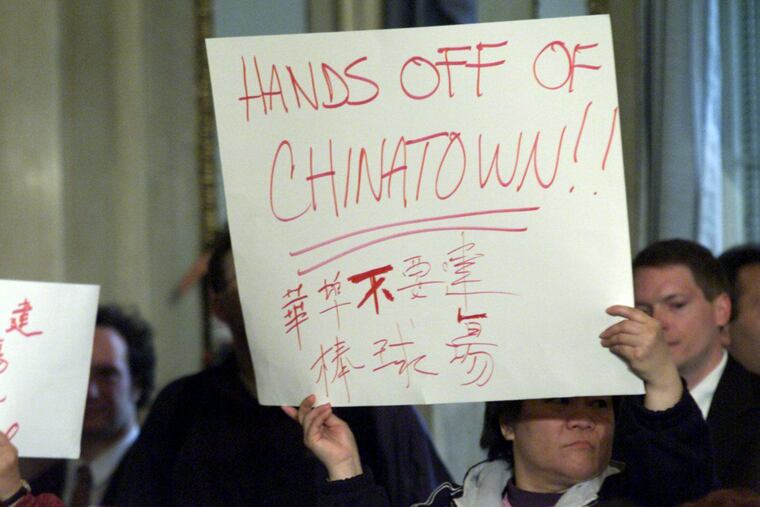I was born and raised in Philly’s Chinatown. I don’t want a Sixers stadium here.
I was born and raised and continue to live in the Philadelphia Chinatown community. I don't want to see it turn into the Chinatown in D.C., which was transformed by a stadium in the 1990s.

Philadelphia’s Chinatown is home to thousands of people who raise families, work, play, eat, shop, attend classes, and worship. The 76ers stadium proposal in Center City is a threat to the existence of that vibrant community.
Chinatown is a distinctive cultural, social, and economic hub influenced by Asian cultures such as Cantonese, Fujianese, Hong Kong, Northern Sichuan, Vietnamese, Taiwanese, Burmese, Korean, Malaysian, and Thai.
The neighborhood is famous for its vibrant business district, with many restaurants and shops owned and operated by local residents, but the community is much more than a place to get a bite to eat and or to grab a bubble tea. It’s also home to preschools, the Chinese Christian Church, Holy Redeemer Chinese Catholic Church and school, the Crane community recreation space, social and cultural organizations, senior day care programs, and a senior citizen housing complex. We even have our own sports teams — I’m the president of the Philadelphia Suns, which for 50 years has been teaching kids basketball and volleyball, among other programs. As we say on our website, “entire families have grown up through the Suns.”
Recent immigrants receive assistance in getting acclimated to life in the United States with help from organizations that offer English lessons, and help in finding a job and affordable housing. Chinatown is the largest ethnic community in Center City. The community has been home to recent immigrants and generations of families for more than 150 years.
» READ MORE: Chinatown coalition calls Sixers arena proposal a threat to their neighborhood’s identity
I was born and raised and continue to live in the Philadelphia Chinatown community. And I know this is not the first time that Chinatown has been threatened by redevelopment plans. In the 1970s, the expansion of the Vine Street Expressway called for the elimination of the Holy Redeemer Church and school at 10th and Vine streets. To preserve the community, Chinatown residents and supporters have fought the development of a prison, opposed casinos, and a proposed Phillies baseball stadium. We believed then what we believe now: A large development like a stadium could threaten our entire existence.
A development of this magnitude will affect all Center City neighborhoods and add to an existing problem of limited parking and rising rents. It would squeeze more people and cars into a bustling area. Gentrification is a concern. The construction of a stadium will draw associated businesses to the area, which will cause real estate costs in the area to rise and drive out family-owned businesses.
Don’t believe me? Just look at the Chinatown in Washington, D.C., which was decimated after it became the site of its hockey and basketball stadium in the 1990s. Between 1990 and 2010, the percentage of people living in the D.C. Chinatown area fell from 66% to 21%. Today, it doesn’t feel anything like it used to. I don’t want to see that happen in Philadelphia.
“Why relocate if the arenas are already conveniently located in one area?”
The sports complex in South Philadelphia, Lincoln Financial Field, Citizens Bank Park, Wells Fargo Center, Xfinity Live, plus a casino, can accommodate several events simultaneously. Public transportation to those arenas already exists. Why relocate if the arenas are already conveniently located in one area? What other areas in the city already have this kind of space for parking, development, and transportation, as well as wide streets?
To build and relocate would cost millions of dollars more than if a rebuild or expansion of a stadium is done in South Philly. But more importantly, people’s lives, work, and quality of life will be greatly affected.
We oppose the development of a stadium in close proximity to the Chinatown community. It would have a negative impact on the lives of residents, businesses, and visitors to the area.
Harry Leong is the president of the Philadelphia Suns.